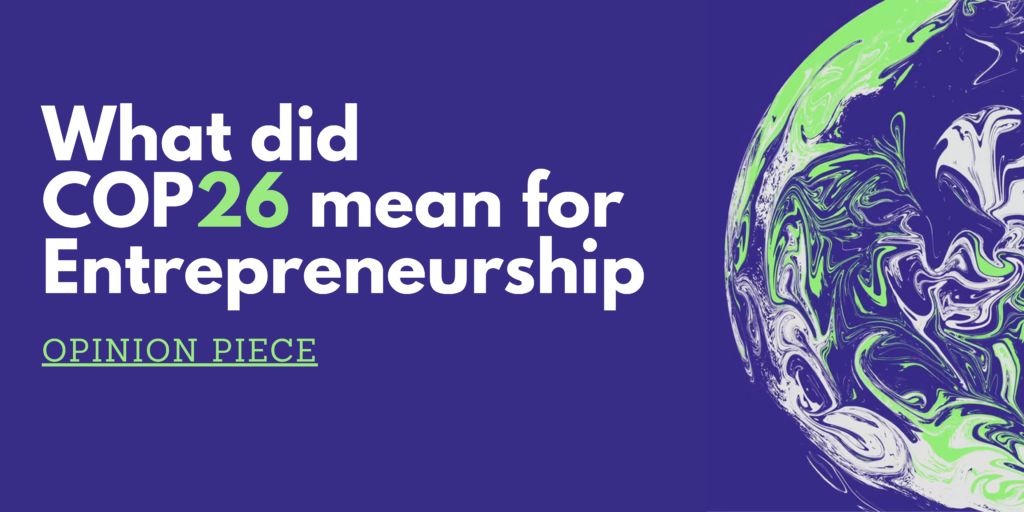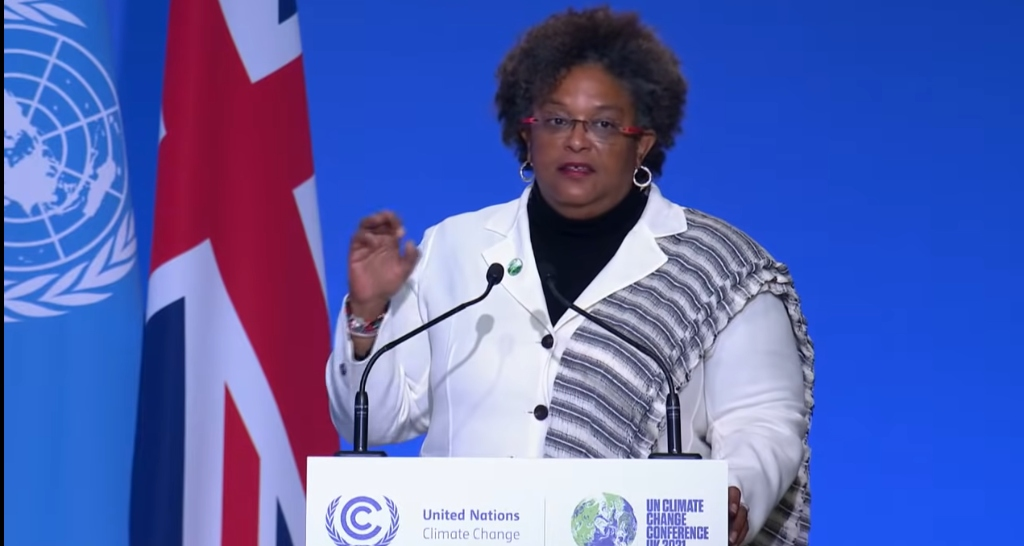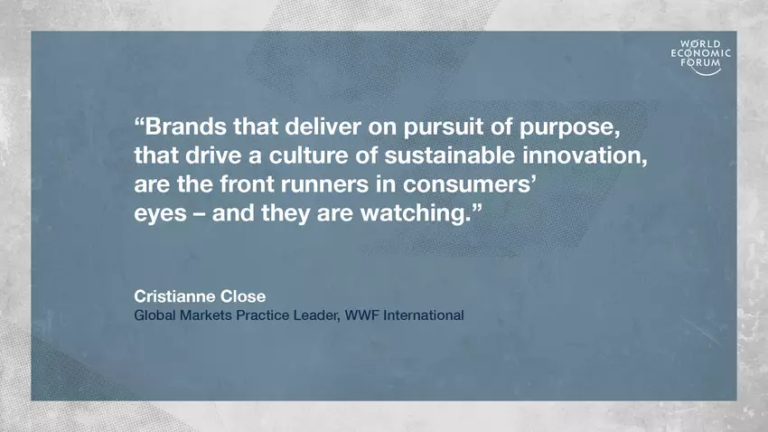21 Apr Is Climate Change influencing Entrepreneurship

Last year, the United Kingdom hosted the 26th United Nations Climate Change Conference of the Parties (COP26) in Glasgow on 31 October – 13 November 2021. This global initiative brought leaders of government, business, and civil society together to begin mapping a path towards reduced emissions of carbon dioxide (CO2) – a greenhouse gas that causes climate change. Climate change is defined by the United Nations, as “long term shifts in temperatures and weather patterns”. Without intervention, the Earth is projected to warm between 3-4 degrees Celsius in under 80 years. COP 26 was a global rallying call to keep the rising temperature to within 1.5 degrees Celsius and avert a “climate catastrophe” of disastrous sea level rises, uninhabitable regions, and loss of human life and biodiversity.
If this turn of events may seem better suited to a science fiction disaster film and not a critical factor in your business’s strategic plan, then think again. Our current reality is that COP 26 and its ensuing policy decisions and trends, should and will matter not only to multinational corporations but small and micro businesses operating in the hot seat of climate changes within our island state. Here are 5 major reasons why COP 26 should matter to today’s entrepreneurs and tomorrow’s innovators.
1. Opportunities for new and innovative solutions to tackle Climate Change
Climate Solutions are products and services which help us adapt to or mitigate the effects of climate change. According to the Nature Conservancy, these solutions can be based on natural interventions that increase carbon storage or avoid greenhouse gas emissions in ecosystems through measures such as conservation, restoration, and improved land management actions. However, many business opportunities exist in the introduction and use of climate technologies that rely upon the direct removal, capture, and sequester of carbon dioxide from the atmosphere. These actions generate carbon credits which serve as verifiable and measurable reductions in emissions of greenhouse gases. St Lucian-based business, Algas Organics, has been retailing Algas Total Plant Tonic, a sargassum seaweed-based fertilizer, since 2015. Not only does their product address sargassum seaweed swells, which affect Caribbean coastlines, but also allows for a more affordable, organic fertilizer. The seaweed absorbs carbon emissions, so that its continuous removal and regrowth, allows for direct sequestering of carbon dioxide from the atmosphere.

Sargassum seaweed on Tobago’s beaches remains an untapped resource. Photo by Sean McCoon, Environment Tobago
As of 2010, Trinidad and Tobago’s land use and agriculture sector contributed towards 2% of total emissions. Globally, the agriculture sector generates between 19-29% of total greenhouse gas emissions. Climate solutions such as climate-smart agricultural practises, tackle both food security and climate change while managing the landscapes which support crops, forests, livestock, and fisheries. Local husband and wife team of Dillon Kurban and Kristy Naidoo, own and manage 3D Aquaponics Solutions which specialises in the design and installation of aquaponic systems. Naidoo believes that aquaponics is helping to support climate-smart agriculture and sustainable food production as it can “grow the same amount as traditional farming in 1/8th of the space.” Not only does this reduce greenhouse gas emission by eliminating deforestation but there are “also no harmful pollutants and insects can visit and pollinate plants”, says Naidoo.
Tomorrow’s entrepreneurs will be tasked with implementing climate solutions along the agriculture value chain. The focus must also be placed on improving water use and management, promoting community-based seed production, mainstreaming non-chemical pesticide management, and perfecting nutrient management while reducing dependence on greenhouse gases.
2. Prioritisation of energy and resource efficiency
The Global Environmental Facility (GEF) projects that global energy demand is projected to grow by 30% in the next 20 years. Innovators who can identify how to lower emissions, save energy, reduce waste and save money will find ample opportunities in energy audits for residential and commercial spaces; green or sustainable building design with a focus on reduced cooling; and climate-based applications across manufacturing and industrial sectors.
RESCOTT Limited – the Solar Company – has seen a 40% year-on-year increase in requests for energy audits. According to Managing Director and Founder of RESCOTT Limited, Graeme Jones, most of their clients in the industrial and commercial sector, “are already aware (or they become aware through RESSCOTT LTD) that achieving heightened amounts of energy efficiency can significantly reduce the investment cost of renewable energy projects to achieve their net carbon reduction targets.” It should come as no surprise that energy audits are offered at a “reduced cost”. These practical measures help entice and prepare businesses for what Jones describes as “the almost inevitable increase of electrical utility prices coupled with global mandates for carbon reduction”.
The United Nations Environment Programme in 2009, identified the building sector as having “the most potential for delivering significant and cost-effective greenhouse gas emissions”. ‘Green’ buildings reduce or eliminate the negative impacts involved in their design, construction or operation. They can even create positive impacts for the health and well-being of persons who live and work in them. With the building sector contributing towards nearly a third of global greenhouse gas emissions, a revolution in T&T’s construction and business sector can have enormous potential. When asked for his outlook on opportunities, Jones shared that “we can see a greater amount of collaboration between the architecture, construction and renewable energy sectors as we continue to adopt more passive solar energy elements and LEED (Leadership in Energy and Environmental Design) green building designs”. This collaboration would not only be beneficial towards the climate but help stimulate T&T’s economy through job creation as well.
The Savannah East building is the first Leadership in Energy and Environmental Design (LEED) certified building in the English-speaking Caribbean, achieving its LEED Silver Certification in 2017. Photo credited to Servus Ltd.

Trinidad and Tobago, as a leader in the manufacturing industry across the Caribbean is uniquely poised to adopt the global thrust towards improved resource efficiency across the value chain. This circular economy, according to the United States Environmental Protection Agency, ‘reduces (the) material used, redesigns materials to be less resource-intensive, and recaptures “waste” as a resource to manufacture new materials and products.’ Less energy usage is a natural by-product of such systems and business models. In 2020, local business Soular copped second place at the global Shell Top Ten Innovators competition for its innovative Mayan style brewing cacao which turns cacao waste into a consumable product and reduces GHG emissions of carbon dioxide and methane gas by eliminating the need for the traditional waste to be transported and processed at a landfill.
3. Climate financing is the next billion-dollar investment
Over 100 billion dollars have been pledged annually as ‘climate finance’ to countries that are less financially endowed. The United Nations Framework on Climate Change describes climate financing as blended financing from public and private sources which support mitigation and adaptation initiatives by vulnerable communities and nations. This funding is currently applied through a range of novel and traditional financial instruments including loans, grants, and guarantees. Loan-based instruments may adhere to market-based interest rates or have set periods of time and interest for repayment such as climate/green bonds. Conversely, concessional loans may be provided which are characterised by longer repayment terms and lower interest rates. One entity such as an alliance, agency, or country, may choose to jointly co-finance a climate change activity or, fund another entity once the results of the activity have been achieved (results-based finance). Where a default on these climate activities occurs, one entity may offer a guarantee to pay any debt incurred, or a financial institution may offer a debt swap or forgive this foreign exchange debt, in return for the implementation of mitigation and adaptation activities. Other financial instruments include investment insurance/risk management for disasters resulting due to climate change and payment for ecosystem services.

Barbados Prime Minister Mia Amor Mottley, at COP26, heralded the call for more climate change adaptation finance for small island developing states.
Grants may be combined with technical non-financial assistance, such as those eligible to public-private partnerships within Latin America and the Caribbean through the InterAmerican Development Bank’s Sustainable Energy and Climate Change Initiative (SECCI) which supports the introduction of clean energy projects.
In order for Trinidad and Tobago to meet its emission reduction targets, known as nationally determined contributions (NDCs), an estimated USD $2 billion must be sourced through local and international climate financing.
4. COP 26 will usher in compliance with new regulations and standards
Globally, several countries such as Germany, Nigeria, Fiji, Uganda, and Canada have created and adopted ‘climate change’ or ‘net zero emissions accountability’ acts, thus providing a legal framework for achieving net-zero emissions, or related climate goals.
At COP 26, Trinidad and Tobago pledged to reduce overall emissions from three sectors by 15% (or 103 million tonnes of carbon dioxide) by the year 2030. This trifecta of reduced emissions in the transportation, power generation, and industrial sectors has been described as “low-hanging fruit” by the Head of the Energy Unit at the Caricom Secretariat, Dr. Devon Gardner. However, we can expect that any new regulations or policy decisions will target these sectors first. Trinidad and Tobago’s Draft National Climate Change Policy (2011) focuses on GHG reduction, environmental protection, and climate change adaptation with the implementation of specific measures. These include energy-related measures such as the development and use of renewable energy policy and standards, street lighting using light-emitting diodes (LED) (which is already underway), and increased energy efficiency in commercial and residential buildings. This is also coupled with the increased use of clean technology and alternative fuels in transportation. At the national and community level, our level of vulnerability and adaptation towards climate change is also being assessed.
CNG-powered maxi taxis provide a cleaner form of transportation. Photo by Ricqolia Phillips, Loop News.

Complementary legislation such as the Waste Management Rules, 2021which will come into effect in May 2022, pertains to the “generation, processing, treatment, packaging, storage, transportation, collection, disposal, recovery, recycling or other activities related to the treatment of waste other than radioactive waste.”
For businesses seeking to stay ahead of the game, early adoption of energy and waste audits, reviewing their existing environmental management systems (or developing one), and seeking opportunities for continuous improvement on GHG reductions and cleantech use, can allow for credible small wins, before any legislative mandate comes into effect. Voluntary compliance can also differentiate businesses from their competitors and ensure relevance on the international stage, where more rigorous standards apply. For tomorrow’s entrepreneurs, these intended policy measures and standards, represent tangible opportunities for business ideas and innovative solutions.
5. It will drive new consumer and sector trends
It’s not only capital that’s expected to flow towards ‘climate smart’ businesses, but consumers as well. Globally, consumers are utilising their purchasing power, to choose and align themselves with brands that embody an ethos towards sustainability. This ‘eco awakening’ as coined by the World Economic Forum, was noted in PricewaterhouseCoopers’ (PwC) June 2021 Global Consumer Insights Pulse survey, in which half of all global consumers described themselves as becoming more ‘eco-friendly’. Consumers in both developed and developing economies are showing increasing support for brands that practice sustainable business and take active measures to effect positive environmental change. Eco-awakening is most largely represented among the millennial generation (those aged 23-36) who actively pursue eco-friendly consumerism. Their purchasing power leans towards products whose core materials or packaging are considered eco-friendly/biodegradable or made with less packaging. This also extends to the origins of products and the overall consciousness of the company towards protecting the environment. However, consumers run the risk of ‘green washing’ whereby companies deceptively market products and services as sustainable. In Trinidad and Tobago, the TTCS 9 standard, developed by the Trinidad and Tobago Bureau of Standards (TTBS), addresses this, by standardising and improving product labelling across food-contact single-use products and packaging by differentiating among terms such as biodegradable and compostable, for instance, and mandating the use of English on product packaging and labelling. For business owners in the food and beverage sector, whether as an importer, manufacturer, or retailer of consumer-ready goods, this standard is definitely one to understand and comply with, or face consumer backlash.

Locally, businesses across all sectors, must not only recognise the impact of climate change but take active steps to be part of the solution. This could be realised through becoming T&T’s first carbon-neutral business – a feat achieved in Colombia, by major food company Tosh in 2018 which offsets its GHG production, by removing an equivalent amount through the purchase of carbon credits. Marcus Sun Kow, managing director of Fresh Start Juices, believes that import substitution can help reduce GHG emissions from T&T’s food and beverage sector and address the rising costs of imports and challenges in shipping, brought on by the Covid-19 pandemic. “One of the main things we can look at is more import substitution – so in that sense, buying local and processing local so that we’re reducing our carbon footprint and not using all that fossil fuels to bring food in that is thousands of miles away, and still have to sit in a chiller until sold.” – said Sun Kow. He envisions a future where food “could be grown in Chaguanas, processed in Moruga and sold in Massy, West Moorings – all being done within a hundred-mile radius.”
For now, businesses may implement strict monitoring controls over their packaging, logistics, production, and transportation processes, to better understand and control their carbon emissions. Entrepreneurial thinkers may even get into the business of offering carbon neutrality consultancy and certification to aid other companies.
The world has become increasingly more aware of the carbon footprint of the fashion industry and its contribution to 8-10% of global carbon emissions and just under 20% of wastewater. Little is known about the carbon footprint of T&T’s celebration of culture, food, festivity, and fashion – our annual Carnival. One local business, Carnicycle, recycles carnival costumes and sells and repurposes feathers, gems and jewellery. In a post-pandemic world, a T&T Carnival of carbon-neutral fetes, electric-powered music trucks, a recycled costume industry and, hot corn soup in biodegradable or compostable food packaging, may indeed crown our Carnival as the ‘greatest and the most sustainable show on Earth’.
What’s next for our common future?
Undoubtedly, limiting global warming to 1.5 degrees Celsius requires more than legislative mandates or the injection of big funding into climate change adaptation and technology. COP 26 should and must spark a revolution of behavioural change at the level of the consumer and business. The 27th United Nations Climate Change conference (COP 27) is only a few months away, scheduled to be held in Sharm el-Sheikh, Egypt. We can only expect that business owners, from micro to multinational corporations, all have a role to play in securing our common future. With the effects of climate change expected to be the most impactful to small island developing states such as ours, the choice towards responsible change, is one that must be made today.
